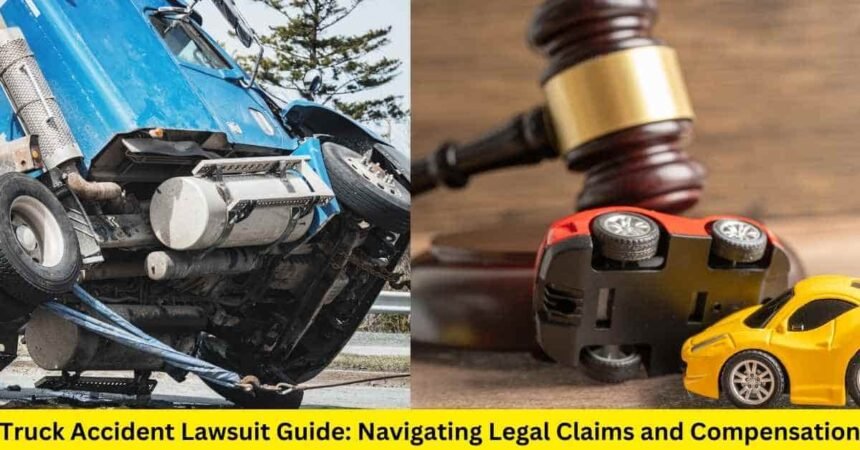Truck accidents are a devastating reality on our roads, with the National Highway Traffic Safety Administration (NHTSA) reporting approximately 4,951 people killed in crashes involving large trucks in 2018. The aftermath of such an incident can leave victims with severe injuries, emotional trauma, and financial burdens. It’s crucial for those affected to understand their legal rights and the potential to seek compensation through a truck accident lawsuit.
Understanding Truck Accidents
Truck accidents occur for various reasons, often involving large commercial vehicles like semi-trucks, 18-wheelers, and tanker trucks. These collisions can be due to driver error, such as fatigue or distracted driving, or equipment failure, where brakes or tires malfunction. Adverse weather conditions and poor road conditions also contribute to accidents, as do failures in traffic signals and signage.
Determining Liability in Truck Accidents
Identifying the negligent party in a truck accident is essential for a successful lawsuit. Liability can fall on multiple parties, including the truck driver, trucking company, cargo loaders, truck manufacturers, and maintenance providers. These parties must adhere to strict state and federal trucking regulations, and failure to comply can be a critical factor in proving negligence.
What Can You Sue for in a Truck Accident?
Victims of truck accidents can pursue various claims for compensation. Personal injury claims cover medical expenses, lost wages, pain and suffering, and emotional distress. In tragic circumstances, families may file wrongful death claims, seeking compensation for funeral expenses, loss of financial support, and loss of companionship. In cases of gross negligence, punitive damages may be awarded to punish the liable party and deter future misconduct.
Collecting Evidence to Support Your Claim
Building a strong case requires substantial evidence. This includes obtaining the police report, securing witness statements, analyzing the truck driver’s logbook, and reviewing black box data. Surveillance footage from nearby cameras and testimonies from accident reconstruction experts can also provide invaluable insights into the accident’s circumstances.
The Legal Process: Steps to Take After a Truck Accident
The steps taken immediately after a truck accident are critical. Victims should prioritize seeking medical attention and reporting the accident to the authorities. Documenting the scene with photos and notes can be vital for future claims. Engaging with a Best Houston truck accident lawyer early on can help navigate the complex legal process, from filing the lawsuit to negotiating settlements or going to trial. The statute of limitations for these claims varies by state, making timely action essential.
Understanding Comparative Fault
Comparative fault is a legal concept that may reduce compensation if the victim is found partially responsible for the accident. The reduction corresponds to the percentage of fault assigned to the victim. Understanding how this principle applies to your case is crucial in anticipating the potential outcome of your lawsuit.
Compensation in Truck Accident Cases
Compensation in truck accident cases is categorized into economic damages, which cover quantifiable losses like medical bills, and non-economic damages, which compensate for more subjective losses such as pain and suffering. The amount of compensation awarded can be influenced by the severity of injuries, the impact on the victim’s quality of life, and the degree of negligence involved.
Hiring a Personal Injury Lawyer
Securing the services of a specialized personal injury lawyer can significantly impact the outcome of a truck accident lawsuit. An experienced attorney understands the intricacies of truck accident cases and can help victims navigate the complex legal landscape, ensuring they receive the maximum compensation they deserve.
Common Challenges in Truck Accident Lawsuits
Truck accident lawsuits often present several challenges that can complicate the path to compensation. Disputes over liability are common, as multiple parties involved in the operation and maintenance of a commercial truck can contribute to an accident. Victims must be prepared to face large trucking companies and insurers, who are equipped with experienced legal teams dedicated to minimizing payouts.
Dealing with insurance companies can be particularly daunting. These companies often employ tactics to reduce their financial responsibility, such as questioning the severity of injuries or alleging comparative fault. Furthermore, the complexities of trucking industry regulations mean that understanding the nuances of the law is essential. Regulations cover aspects such as service hours, vehicle maintenance, and load securing, and proving a violation requires thorough knowledge of these standards.
Conclusion
The aftermath of a truck accident can be overwhelming, but understanding your rights and the process of pursuing a lawsuit can provide a roadmap to justice and compensation. It’s essential to act promptly, collect evidence meticulously, and seek the guidance of a knowledgeable attorney who can advocate on your behalf.
Victims should remember that they are not alone in this journey. With the right guidance and legal support, it is possible to navigate the complexities of a truck accident claim and emerge with the compensation needed to facilitate recovery and move forward with life.
If you or a loved one has been involved in a truck accident, don’t hesitate to seek the help you need. Contact a skilled attorney who can evaluate your case, guide you through the legal process, and fight for the compensation you deserve. Remember, time is of the essence, so it’s important to act quickly to protect your rights and secure your future. For expert legal assistance, consider reaching out to a Best Houston truck accident lawyer today.





